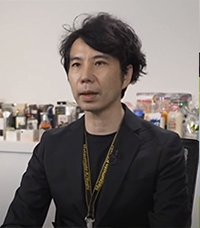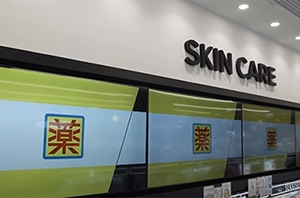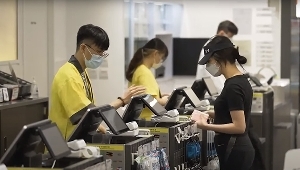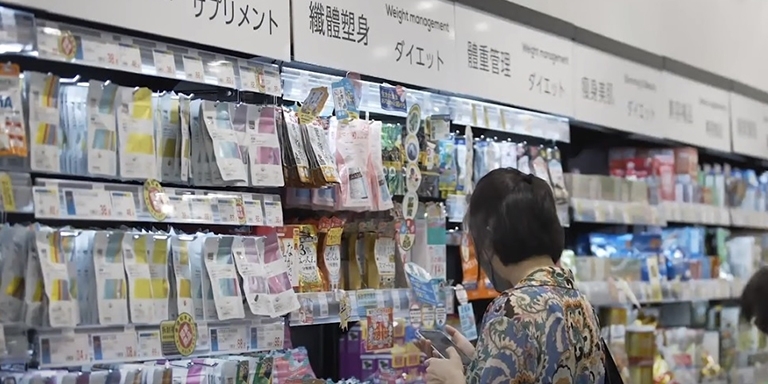As an international financial centre, Hong Kong is an ideal development base for many overseas enterprises – and the city’s attraction is enhanced by the comprehensive protection its intellectual property laws provide. Some well-known Japanese chain drugstores have chosen to open stores in Hong Kong, and have applied for trademark registration to enhance consumers' recognition of their brands.
Matsumoto Kiyoshi, a popular Japanese drugstore, was not deterred by the COVID-19 pandemic. This year, it officially entered the Hong Kong market, expanding its business by opening stores in the city. The company even used the character for “medicine” as a registered trademark to gradually establish its corporate image and brand value, and to more comprehensively penetrate the “cosmeceutical” market in Hong Kong and Asia.
Trademarking health

Yasunori Hayashi, Director of Matsumoto Kiyoshi's Hong Kong branch, said the company noticed that many foreign tourists visiting Japan made a point of shopping in its stores.
“According to the data around 2018, about 5% to 6% of these foreign tourists were Hong Kong people, and their spending was also very high, so we thought that if Hong Kong customers can't come to Japan, then they would enjoy shopping in our store in Hong Kong, so we decided to open a store here."
Mr Hayashi pointed out that Hong Kong people have high spending power and are increasingly health conscious. The city also has a sound intellectual property (IP) system, leading the chain to open for business in Hong Kong and offer a selection of Japanese beauty and skincare brands as well as health products. The chain also sells its own Japanese-made products to attract customers.
So far, Matsumoto Kiyoshi has opened stores in large landmark shopping malls such as Kwun Tong APM Shopping Centre, Sha Tin New Town Plaza and Tuen Mun Town Plaza, with plans to expand further across Hong Kong.

While the Hong Kong market is undoubtedly full of opportunities for overseas companies, it is also fiercely competitive. Therefore, Matsumoto Kiyoshi used a simple and easy-to-understand trademark design that uses the character for “medicine” (and its Japanese name) to clearly bring out the concept of “beauty and health” and to help establish its “first brother” status in the cosmeceutical industry in the minds of consumers.
“Trademarks are the same as our brands; consumers know us through trademarks, so they play a very important role,” Mr Hayashi said. “Our company's trademarks have always used the word ‘medicine’ as the main symbol. Hong Kong people understand Chinese characters. There is no problem with trademarking the word, but it is not necessarily usable in other markets.
“Since customers may not understand the trademark character ‘medicine’, we thought that it might be better to simply use the shape instead of the word, in order to allow flexibility. When people start to recognise us, we can decide to revert the trademark to the existing form, so that even if the public can’t understand it at first, they can gradually understand its meaning.”
Building trust

Applying for trademark registration prevents imitation by competitors and makes consumers more aware of a product’s authenticity, greatly improving trust in brands. Hong Kong has a safe and robust trademark registration system that helps attract overseas enterprises to invest and develop in Hong Kong.
Mr Hayashi believes trademarks can directly reflect an enterprise’s corporate image and brand value. When designing trademarks, companies should consider all aspects so consumers can gauge the company’s position at a glance. Applying for trademark registration does more to protect the brand and enhance consumer recognition.
Mr Hayashi said Hong Kong has a strong consumer market and Matsumoto Kiyoshi had already seen the potential long before the pandemic began. However, the company opted to open its first outlets in the city amid the pandemic in order to meet Hong Kong people's demand for quality Japanese products.
"Hong Kong's per capita GDP is 1.2 times that of Japan and its population density is 18 times that of Japan. The city also includes consumers with high purchasing power, which means there are many potential target consumers,” Mr Hayashi said.
Related links
Matsukiyo Hong Kong
Asian Licencing Conference
Video presentation
